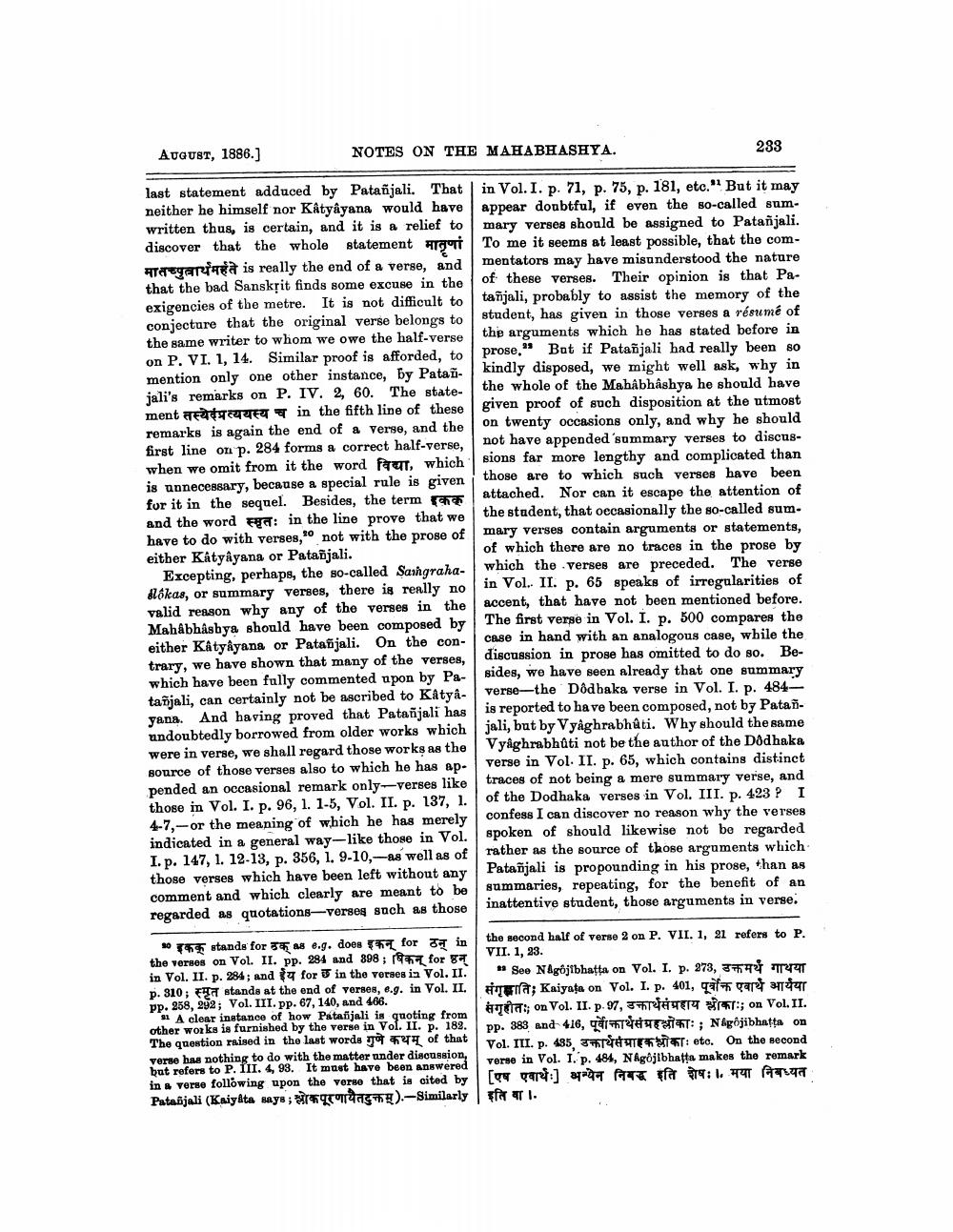________________
August, 1886.]
NOTES ON THE MAHABHASHYA.
233
last statement adduced by Patañjali. That in Vol. I. p. 71, p. 75, p. 181, etc." But it may neither he himself nor Kâtyâyana would have appear doubtful, if even the so-called sumwritten thus, is certain, and it is a relief to mary verses should be assigned to Patanjali. discover that the whole statement Algort To me it seems at least possible, that the comATT Tarind is really the end of a verse, and mentators may have misunderstood the nature that the bad Sanskrit finds some excuse in the of these verses. Their opinion is that Paexigencies of the metre. It is not difficult to tasijali, probably to assist the memory of the conjecture that the original verse belongs to
me that the original verse belongs to student, has given in those verses a résumé of the same writer to whom we owe the half-verse
the arguments which he has stated before in on P. VI. 1, 14. Similar proof is afforded, to
prose." But if Patañjali had really been 80 mention only one other instance, by Patai- kindly disposed, we might well ask, why in jali's remarks on P. IV. 2, 60. The state- the whole of the Mahâbhâshya he should have ment तस्येदप्रत्ययस्य च in the fifth line of these given proof of such disposition at the utmost remarks is again the end of a verse, and the on twenty occasions only, and why he should first line on p. 284 forms a correct half-verse, not have appended 'summary verses to discus. when we omit from it the word fut, which sions far more lengthy and complicated than is unnecessary, because a special rule is given those are to which such verses have been for it in the sequel. the sequel. Besides, the term
Besides, the term the attached. Nor can it escape the attention of and the word FC: in the line prove that we
the student, that occasionally the so-called sum. have to do with verses, 0 not with the prose of mary verses contain arguments or statements, either Katyayana or Patañjali.
of which there are no traces in the prose by Excepting, perhaps, the so-called Sarngraha- which the verses are preceded. The verse dlókas, or summary verses, there is really no in Vol. II. p. 65 speaks of irregularities of valid reason why any of the verses in the accent, that have not been mentioned before. Mahâbhâsbya should have been composed by The first verse in Vol. I. p. 500 compares the either Kâtyâyana or Patanjali. On the con- case in hand with an analogous case, while the trary, we have shown that many of the verses, discussion in prose has omitted to do so. Bewhich have been fully commented upon by Pa- sides, we have seen already that one summary tañjali, can certainly not be ascribed to Katya
verse--the Dodbaka verse in Vol. I. p. 484yana. And having proved that Patañjali has is reported to have been composed, not by Patanundoubtedly borrowed from older works which jali, but by Vyâghrabhati. Why should the same were in verse, we shall regard those works as the Vyâghrabhati not be the author of the Dodhaka source of those verses also to which he has ap- verse in Vol. II. p. 65, which contains distinct pended an occasional remark only-verses like traces of not being a mere summary verse, and those in Vol. I. p. 96, 1. 1-5, Vol. II. p. 137, 1. of the Dodhaka verses in Vol. III. p. 423 ? I 4-7,-or the meaning of which he has merely
erely confess I can discover no reason why the verses indicated in a general way-like those in Vol. spoken of should likewise not be regarded I. p. 147, 1. 12-13, p. 356, 1. 9-10,-as well as of rather as the source of those arguments which those verses which have been left without any Patañjali is propounding in his prose, han as comment and which clearly are meant to be summaries, repeating, for the benefit of an regarded as quotations-verses such as those inattentive student, those arguments in verse. इकक stands for उक्a se.g.does इकन् for ठन् in
the second half of verse 2 on P. VII. 1, 21 refers to P. the versos on Vol. II. pp. 284 and 898; for 8
VII. 1, 23. in Vol. II. p. 284; and for 3 in the verses ia Vol. II.
See Negójtbhatta on Vol. I. p. 373, 373 p. 310; F stands at the end of verses, e.g. in Vol. II. Tra; Kaiyata on Vol. I. p. 401, qat garatur pp. 258, 292; Vol. III. pp. 67, 140, and 466. A clear instance of how Patafjali is quoting from
horas on Vol. II. p. 97, LETY ; on Vol. II. other works is furnished by the verse in Vol. II. p. 183. pp. 383 and 416,
T: ; Nagôjibhatta on The question raised in the last words
of that
Vol. III. p. 485, ** TE* : eto. On the second verse has nothing to do with the matter under discussion, but refers to P. III. 4, 93. It must have been answered
verso in Vol. 1. p. 484, Nagôjibhatta makes the remark in a verse following upon the verse that is cited by
[एष एवार्थः] भन्येन निबद्ध इति शेषः। मया निबध्यत Patanjali (Kaiyata says; T 405 ).-Similarly for I.




